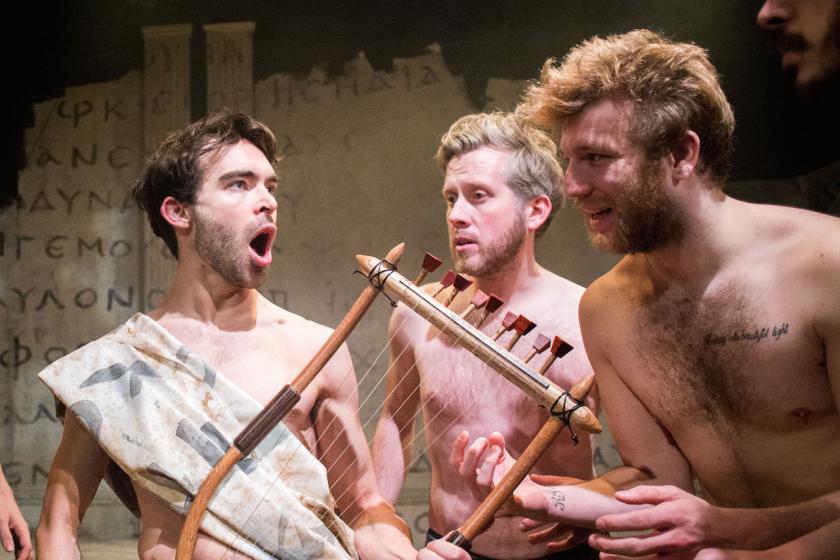When a leading fringe theatre starts the year with a production whose gender ratio is 8:1 in favour of men, it had better have a good reason. When seven of those eight are wearing prosthetic penises, it had better have a very good reason. And a plan in place for a glut of women on its stage next season.
Yet the sheer enjoyment to be had from Tony Harrison’s muscular rhyming verse is almost reason enough to revive The Trackers of Oxyrynchus after nearly 30 years. There’s also rarity value in its subject matter: the satyr play. Where a good handful of the many thousand tragedies that once played in ancient Greece have made it into the 21st century, a single satyr play survives. Tragedies were performed in threes, separated by short works in which a chorus of satyrs – part man, part goat, sporting strap-on phalluses – offered ribald comic relief.
Inspired by the discovery of Sophocles’ satyr play The Ichneutae ("The Trackers") on an archaeological dig in Egypt in 1907, Harrison begins his own version of that play by introducing the two Oxford dons who found the fragments on a rubbish heap in the city of Oxyrhynchus. While Arthur Hunt (Richard Glaves) is content to log a stream of routine finds of fifth-century BC papyrus – most of them complaints about homelessness – his wild-eyed colleague Bernard Grenfell (Tom Purbeck) is bent on unearthing great drama.
![]() Suffering a nervous breakdown, the latter is visited by the god Apollo who commands that he find a play in which he himself plays a starring role. Grenfell duly morphs into Apollo, and Hunt becomes Silenus (pictured right), foreman of a troupe of satyrs charged with tracking down a herd of cattle stolen from Apollo.
Suffering a nervous breakdown, the latter is visited by the god Apollo who commands that he find a play in which he himself plays a starring role. Grenfell duly morphs into Apollo, and Hunt becomes Silenus (pictured right), foreman of a troupe of satyrs charged with tracking down a herd of cattle stolen from Apollo.
The moment the bare-chested satyrs burst from packing cases like male strippers from a cake was no doubt more spectacular on the Olivier stage in 1990. For a start, there were more satyrs, and their erect phalluses were famously, eye-poppingly huge. In the tiny Finborough, there isn’t the space to swing a cat, let alone... let's just say it’s not hard to imagine the potential for mishap.
It was a wise decision, then, to go for danglers, albeit in a michievous range of sizes. (You wonder how the actor felt who got allotted the tiny one. Perhaps they take it in turns.) The six guys make up for the loss of virility by snorting a lot, bulking up their chests and pawing the ground. Their clog dances, with a bit more polish, would get them an audition for Stomp.
You have to love a poet who rhymes Plato with potato
Phil Lindley’s design makes good use of the severely limited playing space, lining the walls with Ancient Greek text which at one point the audience is urged to read aloud, like Aladdin's spell – one of many gleeful references to English pantomime. This chimes perfectly with the earthy gusto of Harrison’s rhymed verse which very quickly seems entirely natural, never straining for effect. You have to love a poet who rhymes Plato with potato.
For all the obvious learning involved in bringing Trackers to light, Harrison – and director Jimmy Walters – establish a nicely rugged comic tone, helped by the rigorous metre of the verse punctuated by a few choice sight gags. When the satyrs finally track down the fate of Apollo’s cows, the trail leads them to the infant Hermes, a petulant Dylan Mason in a saggy papyrus nappy. Apollo's cattle are no more. The preposterously precocious baby has used bovine gut to fashion the world’s first musical instrument: a lyre.
The point at which Apollo grabs the lyre for himself, arguing that only the elite should have access to the arts, is the point at which Trackers stops being funny and Harrison declares his political hand. Unfortunately for the Finborough’s production, it’s also the point at which the play feels dated. In the three decades since Trackers’ premiere (at the height of Thatcherism’s stranglehold on class and culture) we have gone a long way towards dissolving the hierarchies of old. Just look at what’s on at the South Bank. Just listen to Radio 3. Poetry’s for posh people? Try telling that to Kate Tempest or Lemn Sissay.
Despite this lost resonance, Richard Glaves’s account of the flaying of Marsyas – the punishment meted out to his brother-satyr who dared to compete in a flute-playing contest with a goddess – creates an intense and moving climax to the play, spinning art from sickening violence and injustice. That, today, is what we need our poets to do.
And as to righting the gender imbalance, how about a revival of Square Rounds, Harrison’s munitions play from 1992? Female actors: 21, male: three.















Add comment